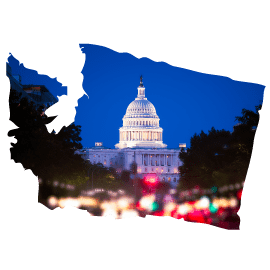Elementary Teacher Preparation in Reading
Instruction : Washington
Delivering Well Prepared Teachers Policy
Analysis of Washington's policies
In its standards for elementary teacher preparation, Washington requires teacher preparation programs to address the science of reading. Programs must provide training in the five instructional components of scientifically based reading instruction: phonemic awareness, phonics, fluency, vocabulary and comprehension.
As of the 2011-2012 school year, all teacher preparation programs must administer the "evidence-based assessment of teaching effectiveness" to all preservice candidates. However, it does not appear that this assessment places any special emphasis on reading instruction.
Recommendations for Washington
Require teacher candidates to pass a rigorous assessment in the science of reading instruction.
While Washington is commended for its new pre-service assessment, it is unclear how this test will be used to measure teacher candidates' knowledge and skills related to the science of reading. The assessment should report a subscore for the science of reading specifically, and elementary teachers who do not possess the minimum knowledge in this area should not be eligible for licensure.
State response to our analysis
Washington recognized the factual accuracy of this analysis. The state added that it is one of five lead states in the 20-state consortium implementing the Teacher Performance Assessment (TPA), which is based on California's TPA and being developed by Stanford University and Pearson. This assessment will be required for the completion of a state teacher preparation program beginning with the 2012-2013 school year.
Select another topic
Delivering Well Prepared Teachers
- Admission into Preparation Programs
- Elementary Teacher Preparation
- Elementary Teacher Preparation in Reading Instruction
- Elementary Teacher Preparation in Mathematics
- Middle School Teacher Preparation
- Secondary Teacher Preparation
- Secondary Teacher Preparation in Science
- Secondary Teacher Preparation in Social Studies
- Special Education Teacher Preparation
- Assessing Professional Knowledge
- Student Teaching
- Teacher Preparation Program Accountability
Expanding the Pool of Teachers
Identifying Effective Teachers
- State Data Systems
- Evaluation of Effectiveness
- Frequency of Evaluations
- Tenure
- Licensure Advancement
- Equitable Distribution

